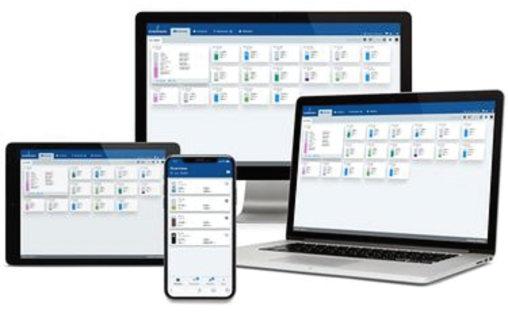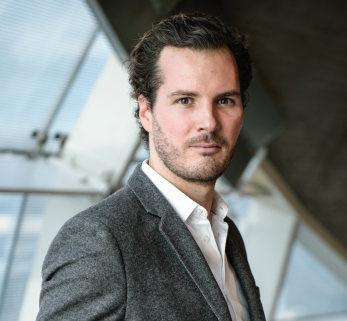
15 minute read
Process automation Work faster, save time, do not compromise safety.
AUTOMATION MAKING MULTI-SECTOR APPEAL
Automation helps the oil and gas workforce to work faster and helps asset owners save time and money without compromising safety. Organisations are increasingly looking to deploy automation to improve their operational performance and make vital efficiency gains.
AUTOMATION OF ENERGY technology is important for mastering the future challenges of sustainable energy supply. It is already being established across oil and gas operations, and some of the latest technologies and collaborations are helping operators with highly specific tasks in sectors and subsectors.
For example, in a recent move to deploy workflow automation software that is specifically tailored to the requirement of the oil and gas industry, Petrofac has signed a three-year partnership with Intoware. The development of ‘WorkfloPlus Oil and Gas’ will further optimise the efficiencies that Petrofac has gained from digitalising maintenance and inspection activity for its clients. The software has been designed to automatically generate digital workflows, schedules and reports for users, eliminating the traditional manual and timeconsuming preparation required.
Steve Johnson, vice-president of digital for Petrofac’s Engineering and Production Services business, commented, “The tool empowers teams to work faster and more efficiently, ultimately saving asset owners time and money without comprising safety.”
Honeywell technology plays a major role in providing automation solutions in large petrochemical complexes. In February 2021, in North Africa, Sidi Kerir Petrochemicals Company (SIDPEC) selected Honeywell technology to upgrade the production capabilities of its flagship petrochemical complex in Alexandria, which produces ethylene and polyethylene for the Egyptian market. Honeywell has replaced SIDPEC’s legacy Honeywell TotalPlant Solution (TPS) production system with the latest version of its Experion Process Knowledge System solution at SIDPEC’s complex in Alexandria.
Also, Anchorage Investments Ltd will use Honeywell UOP’s C3 Oleflex technology to produce 750,000 mt per year of polymergrade propylene for its new Anchor Benitoite petrochemicals complex in Suez, Egypt, near the southern terminus of the Suez Canal. Honeywell UOP’s C3 Oleflex technology converts propane to propylene through catalytic dehydrogenation. The technology is designed to have a lower cash cost of production and higher return on investment when compared to competing dehydrogenation technologies.
It is not just all about the strategic collaborations –companies are developing sophisticated technologies too. The latest on the list is Emerson’s Rosemount TankMaster Mobile –the world’s first cross-platform inventory management software application for tank gauging systems – providing immediate secure access to critical tank data. By making real-time data available to a wider range of stakeholders via smartphones, tablets and computers, this easy-to-use mobile solution facilitates better decision-making and improved operational efficiency and safety.
Per Skogberg, solutions manager with Emerson’s Automation Solutions business, said, “By facilitating secure mobile access to this information, Rosemount TankMaster Mobile provides the opportunity to increase efficiency, drive productivity and improve collaboration throughout the supply chain.”
Emerson's tank inventory software application aims to improves operational efficiency.
STAYING IN TOUCH AT SEA
For many years, leaving for missions on offshore structures was perceived as difficult, with workers staying months away from family and having limited means of communication on board. The offshore sector must now benefit from technologies for an optimised and advanced communication at sea. Tanguy MOREL, CEO and co-founder of Moment, describes.
THE DIGITAL TRANSFORMATION has revolutionised the way we work, the way industries operate, the way the supply chain is managed. A digital approach has undoubtedly become essential to optimise productivity and logistics. However, due to the harsh conditions of the seas and oceans, the offshore industry has not yet fully adopted the digital transformation, slowing down the development of the industry. To help with the digital transition, communication infrastructure could be, early on in the project, taken into account.
Offshore operators’ strategies focus on portfolio expansion, oil exploration and increased production. Yet, the technological options have been limited to support the digital transformation of the industry. While satellite technology has been an important step towards further communications, enabling operators to move away from limited technologies such as morse code, VHF radio and cellular networks, it is an expensive technology, slower and with latency issues.
The necessity to find new effective communication solutions allowing the optimisation of production, enhancement of safety and increasing the well-being of workers is crucial to support the ambitions of the major operators present in Africa. The continent counts some of the most important producers such as Gabon. New high added value local and regional projects, such as in Côte d'Ivoire, Angola and Nigeria, and enhanced growth linked to the efforts of extractive companies to optimise mature fields, make Africa a strategic area that continues to attract operators and investors.
The use of digital technology would enable improved performance, increased uptime, optimised production and enhanced safety onboard. With crew efficiency considered an essential vector to support operators’ development, their onboard conditions must be reviewed in order to respond to their needs and enhance their wellbeing at sea. The fatigue, feelings of isolation and depression may have significant consequences on the mental and physical well-being of those workers who spend long periods at sea on platforms, vessels, surfers or drilling units. Improving the crew’s wellbeing and their onboard living conditions with a reliable and flexible communication solution is no more an option but essential for the industry’s sustainability. The past year has highlighted the need for the petroleum services industry to adapt in order to avoid social conflicts and strikes which can damage their image. Because of its essential role in keeping economies around the world running, the industry needs to find new tools that will help with workers’ retention and enhance their wellbeing while working on a rig.
There is a growing demand for broadband connections and connectivity. Seafarers rely on connectivity to stay in touch with friends and family, check social media, send emails or consult a doctor. Equipped with smartphones or tablets, workers come onboard for several months and expect to have the same experience they can have “at home.” Designed for an offline environment and based on a new generation wireless system, digital platforms generate a local Wi-Fi network accessible from personal electronic devices.
The deployment of this kind of service contributes to upgrading onboard accommodation and improving the lives of seafarers. For offshore operators, it is also a way to strengthen recruitment policies and establish a new environment onboard, an important detail as the sector seeks to gain more productivity.

Tanguy MOREL is the CEO and co-founder of Moment.
Image Credit: Moment
BUILD BACK BETTER SOLVING AFRICA’S ENERGY PROBLEMS
Speaking exclusively with Oil Review Africa (ORA), Marly Diallo, founder of BRT Energy, venture partner at United Capital Group and ambassador for Meaningful Business, has shared insight on powering sustainable solutions to solve Africa’s urgent energy problems.
ORA: Climate emergency and the pandemic aftershock –what are the opportunities coming out of the crisis?
Marly: Petrol stations in Africa are part of economic life. In addition to traditional services (gas, car repair, spare parts) there's an opportunity to manage the climate and pollution risk due to the non-proper disposal of vehicles’ batteries (cars, trucks, buses etc). With the right training and strong engagement, oil companies have the opportunity to enable longer use of the batteries by the local population.
We had a discussion before the crisis with one network in Ghana which is interested in this initiative. The impact can be pretty large. We can reduce the global hazard due to bad battery recycling and push emerging countries to a more circular economy.

What does the pandemic teach the sector about managing climate risk in order to ‘build back better’? Has the pandemic recalibrated the sector’s risk radar?
Marly: The oil and gas industry has experienced a downturn due to the pandemic. According to the Wall Street Journal, spending on oil production worldwide isn’t expected to climb back up to prepandemic levels through at least 2025. This global crisis has forced stakeholders to explore green alternatives to mitigate the risk. As a result of this, the industry is being recalibrated, with clean tech and renewable energy now priorities for many oil and gas companies.
Image Credit: BRT Energy
Marly Diallo is the founder of BRT Energy and ambassador for Meaningful Business.
How can African operators respond to the oil and gas downturn?
Marly: The best way for African operators to respond to the downturn is accelerating the renewable energy investment trend instead of attempting to reverse it. By the end of this decade, non-fossil-fuel investments will make up twothirds of energy spending. This market shift is an opportunity for African operators to partner with startups, innovators and visionary entrepreneurs to build new business models that are lean, agile, and directed towards the future.
How can regional collaboration contribute greater value to the continent’s oil and gas boost? How are governments acting on this?
Marly: By enhancing and scaling their regional collaboration framework, oil and gas companies can tap into better resources such as on-the-ground experience, innovation-driven technology such as digitalisation and market expertise. Building stronger cross-border collaboration and partnerships will help oil and gas companies become better prepared to face uncertainty and economic downturn. The government also has an opportunity to accelerate regional collaboration by privatising national power companies.

THE GOOD COMPANIES ARE SOCIALLY RESPONSIBLE
Oil and gas companies in Africa are stepping up their commitment to corporate and social responsibility (CSR), providing opportunities for local firms and entrepreneurs. Martin Clark reports.
CORPORATE SOCIAL RESPONSIBILITY (CSR) initiatives are growing in Africa, but are not a new thing for the oil and gas industry.
Operators in Nigeria have long worked with local communities to further a huge number of CSR projects, from installing clean water taps outside compounds to erecting whole schools and even small power stations.
But it is a trend that is set to grow in the current climate, with big investment funds and financiers seeking hard evidence of a commitment to CSR and the broad umbrella of concerns it encompasses.
Shell’s experiences in Nigeria over decades have given it unique insight into this area.
In its 2020 Sustainability Report, the company further highlighted its commitment to the area, which last year included a US$10mn pledge to Covax, the programme working for equitable access to Covid-19 vaccines in poorer countries.
In February 2021, its chief executive, Ben van Beurden, also unveiled a new initiative –Powering Progress – designed to further integrate sustainability with Shell’s wider business strategy.
It lays out ideas on how the group can help as the world accelerates towards a future of zero- and lower-carbon energy –another growing feature of CSR work.
One of its goals, by 2030, is to provide electricity to 100mn consumers in emerging markets who do not yet have it.
Work is already well underway: last year, it completed minority investments in PowerGen, a company that develops, builds and operates mini-grids in Africa.
CSR is not just for the largest multinationals, however.
French independent, Perenco, which has production sites across Central Africa, has supported a whole roster of projects in the territories in which it operates.
These are focused on supporting societal, environmental and economic agendas, all geared to yield a positive development for local communities.
In Gabon, in the Moyen-Ogooué region, 160 km south-east of Libreville, the village of Batanga has benefited from electrical power facilities built by the company during its operations.
These supply more than 80 homes with electricity following the installation of buried cables connected to generators.
In the Democratic Republic of Congo (DRC), Perenco’s power plant – fuelled by its own local gas production – supplies the National Water Company and a city network covering the needs of around 200,000 Muanda inhabitants.
Increasingly, as the expectations and demands placed upon oil companies shift, these responsibilities are likely to result in a swathe of partnership and development opportunities for communities and support services.
The advance of CSR initiatives across the energy sector will be good news for Africa.

The advancement of CSR initiatives across the energy sector will be good news for Africa.
SAIPEC 2021 highlights new-age trends in the oil and gas sector
THE RECENTLY CONCLUDED 5th edition of the Sub-Saharan Africa International Petroleum Exhibition and Conference (SAIPEC) – held virtually from 19-21 May 2021 with the theme, “Post-Covid-19 from Global Crises to Global Opportunity” –featured speakers from across the entire oil and gas value chain who gave their thoughts and solutions available for Africa’s ever-evolving energy industry.
The participants were benefitted from the direct access to the primary stakeholders and key players in the African energy sector supply and value chains. Across three days, speakers and delegates had the opportunity to participate in business, technical and special focus sessions, providing critical insights into the region's hydrocarbon businesses.
This, coupled with excellent networking opportunities, allowed participants to engage with peers from local, regional and international businesses that want to develop business opportunities in a relaxed and friendly environment. The virtual international exhibition attracted an increasing number of specialised companies who showcased their latest products and services, including many international and regional energy companies and service providers, regional and national oil companies. SAIPEC 2021 attracted more than 6,000 visiting professionals from across subSaharan Africa, Europe, Americas and Asia.
The chairman of the Petroleum Technology Association of Nigeria (PETAN), Nicolas Odinuwe, urged governments to develop enabling environments to attract investments into the African oil and gas industry.
In a keynote address, Dr Timpre Sylva, minister of state for petroleum resources, Federal Republic of Nigeria, said that Nigeria still grapples with the effect of the Covid-19driven crisis. However, there are rays of hope. “Life is generally returning to the new normal and evidently economic activities are picking up globally. This represents a fundamental opportunity for the oil and gas industry, because, with increased demand for crude oil, new investment can come on stream. Consequently, the post-Covid-19 world will continue to see the oil and gas industry accelerate its transition towards cleaner energy sources. Product and service delivery will have a paradigm shift from traditional business models.”
“The future of survival and success of many players in the industry depends not only on their achieving greater focus on cleaner energy sources but also upon their ability to deliver lower cost solutions in traditional areas of crude oil and gas production,” Sylva further added.
Speaking about the challenges and solutions in harmonising issues for Nigeria refineries, Emeka Ene, CEO of the Oildata Energy Group which includes ENPOWER Free Trade Zone company FZE, Oildata and Xenergi, stated, “We currently have the absence of a sustainable business model in terms of processing of the petroleum products, selling it at a competitive price and putting that money back into the growth of business. That has been really challenging because the Nigerian refinery sector has a lot of highly professional people who have not really been given the opportunity to demonstrate their capacity. Now, the government is creating a sustainable business model to ensure that the petroleum products are processed and sold at market prices.”
A session on NOCs highlighted the opportunities as several new and existing energy countries offer their prospects. Another panel discussion outlined the dynamics’ of sub-Saharan Africa’s energy, oil and gas as the nations strive to a low carbon future. In a live Q&A with women energy leaders, the audience heard first-hand from female global energy leaders on the key to success, as well as discussing challenges faced and strategies to success in a male dominated industry.
Hungry for offshore energy content? OTC Houston is the platform
THE OFFSHORE TECHNOLOGY Conference (OTC), one of the leading platforms to share advanced scientific and technical knowledge for offshore resources and environmental matters, will be held from 1619 August 2021 at the NRG Park, Houston, Texas, USA.
More than 350 peer-selected technical presentations will be leveraging 13 societies’ collective knowledge and covering topics from the wellbore to topsides and everything in between. The event will provide an opportunity to connect with global C-suite leaders and more than 100 speakers to discover what innovations the industry can expect over the next 50 years.
Some of the conference sessions include: Offshore Oil and Gas Industry Transformation and Smart Technologies: A New Era to Sustain Profitable Operations: The challenges associated with maintaining the lower cost regime that has emerged from the downturn in the deep-water industry has forced manufacturers and operators to work together for better solutions.
Materials and Technology Advancements for Deepwater and HPHT Environments: Materials innovations promise exciting new opportunities for progressing the technological frontiers critical for sustainable advancements, such as energy production, nanoelectronics, artificial intelligence, advanced environmental, among others.
Shaping a Low Carbon Future with Supplier Diversity: Supplier Diversity is the process of integrating diverse suppliers into the execution of corporate strategy. That is why corporations such as bp are coming together for a networking reception and panel discussion to showcase the importance of supplier diversity in offshore.
Spotlight on New Technology Award
The OTC announced the 2021 recipients of the Spotlight on New Technology Award, which recognises new, innovative technologies that are advancing and revolutionising the future of offshore energy. This year, 14 technologies from 13 companies around the world were selected, including five companies receiving small business recognition.
Winners are selected based on five criteria including the technology’s novelty in the marketplace, innovation, demonstrated success, broad commercial appeal, and ability to make a significant impact across the offshore industry.
The spotlight winners include: Dril-Quip; Halliburton and TechnipFMC; Oil States Industries; Saipem; Schlumberger; Siemens Energy; Subsea 7 and autonomous Subsea 7 subsidiary Xodus Group.
As stated in the website, in response to the Covid-19 pandemic, OTC is dedicated to creating and maintaining a safe and healthy environment in compliance and following the guidance from federal, state and local governmental agencies and health authorities.







